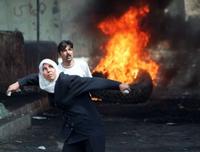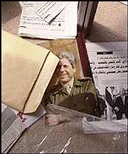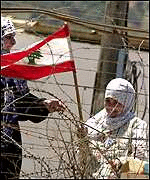Footage of Lebanese women fleeing bombardments has been shown hundreds of times on the television. These were desperate women, tears running down their faces like wounds. Sometimes the news camera showed women raising their arms to the sky, crying defiance. And there have been images of women immobile, petrified by fear. More rarely, the television shows crowds of women, overwhelmed by grief, at the burial of a child or loved-one.These are classic media images of course. Similar pictures reach the TV news producers from Bosnia, Chechnya and Iraq. It is almost as if the women of these strife-torn areas can do little except lament. However a short visit to southern Lebanon quickly shows that women can do far more than hurl their grief.

Israel had thought it could raise walls of silence around villages deserted by men. However, determination overcame this obstacle: the women of southern Lebanon realised that Ghandi-style passive resistance would not be enough. They took arms, too. These women seem so strong; there is no hatred in their eyes, no emotion in their voices, only an immense need to see justice done. Though the media has largely ignored their long and painful struggle, they are not broken. They put up proud and worthy resistance.
Two examples of combat waged by southern Lebanon’s women will suffice.

Soha Bechara is the very incarnation of Lebanon’s refusal to accept foreign occupation. A young woman, fragile and slight, she is known by some as the fiancé of Lebanon. Others call her Lebanon’s Joan of Arc. Held in the terrible Khiyam prison, she came to symbolise place referred to as little Hell. Bechara spent ten years of her life, the very best years, from 21 to 31, in this Israeli Auschwitz. Her crime? To have shot at a Lebanese collaborator, the infamous general Antoine Lahad, who led the Israeli auxiliary forces in the occupied zone until the Israeli withdrawal. Soha Bechara had spent two years preparing her mission.
In geol, she was to undergo three months of electric-shoc torture. There were many other women prisoners, among them the well-known journalist, Cosette Ibrahim. Bechara however, was the only one to spend six years crouching alone in a tiny cell measuring 1.80 m by 90 cm. She and her fellow women prisoners braved both the Israeli enemy and their own society. This is a backward-looking society, which punishes the victims of rape by murdering them, and has little regard for women prisoners, even those fighting for just causes. But all those women with whom this difficult issue was raised came back with the words: ”But what honour is there for those who have lost their land” almost a paraphrase of Churchill famous: “We thought we had avoided war through dishonour, now we will have both dishonour and war!”
Passive resistance

A few years ago, the village of Dir Seriane had a population of 2,300 people. Today, it has only 250 inhabitants, almost exclusively old people, women and children. For 22 years now it is the women who kept things going. Stuck in the crossfire between enemy and resistance, they suffered deeply. The war was theirs from the beginning to end, in all its tragedy and horror. We prefer to die at home rather than abandon our land to the enemy, they would say. For 22 years we have thought only of saving our land. And apart from their land, these are women who have almost nothing. All their possession can be tied up in a bundle at a momentous notice. We have nothing to loose, except our lives, and that is of little importance, they would say. Alone they faced hunger, thirst and epidemics. Water was in short supply, washing kept in the strict minimum. Said the women of Dir Seriane, the powerlessness of the whole world in the face of our misfortune increased our despair and gave us more courage. We learnt that we could count only on ourselves.
Thanks to these strong women, Dir Seriane was never annexed, even though those women had no resources. They were alone, barehanded, for 22 years.